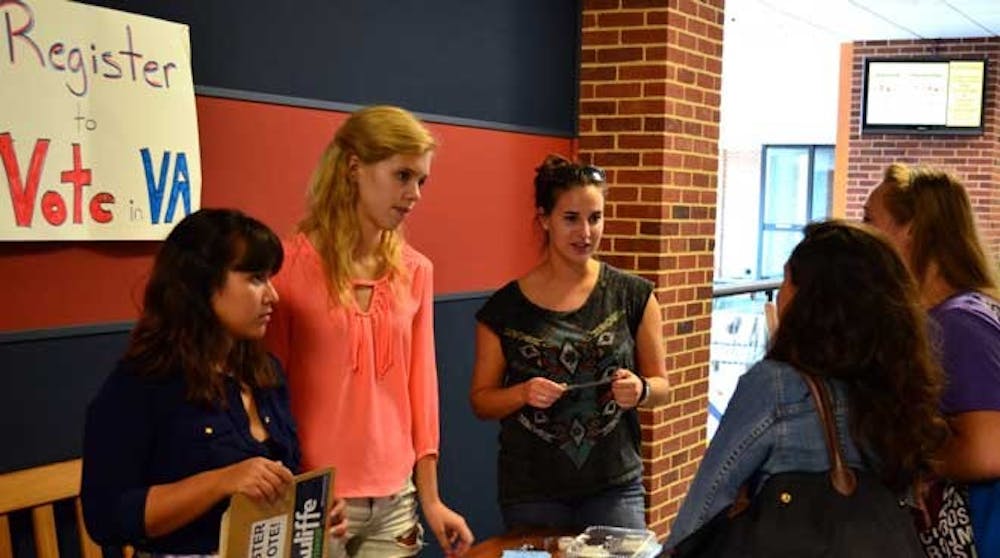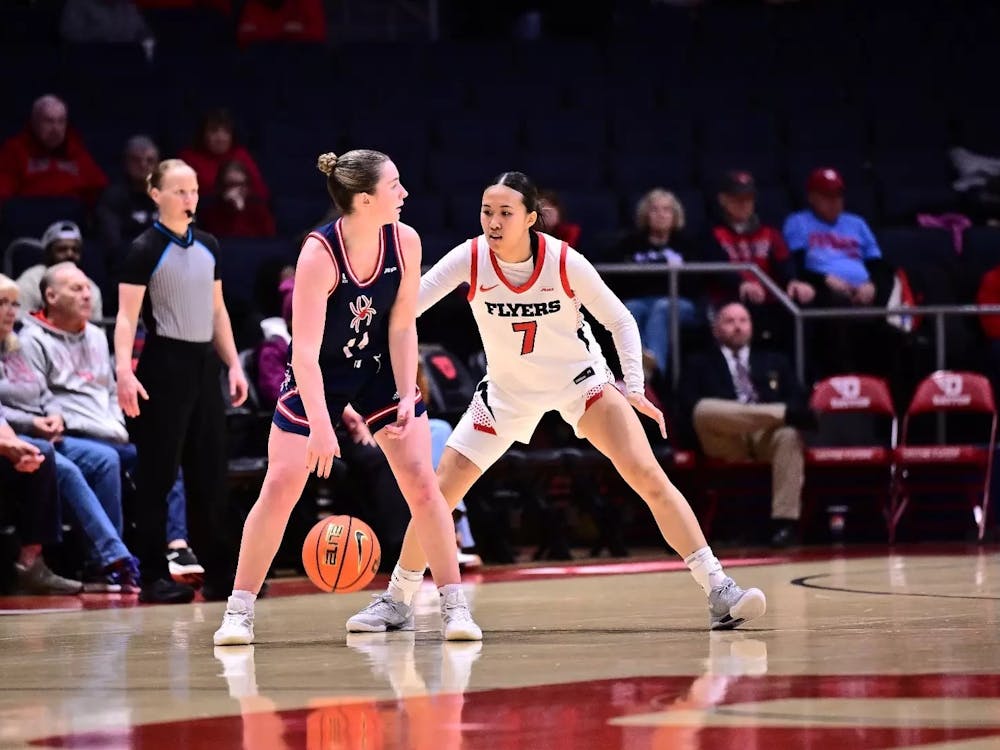Of the various student clubs and organizations manning tables in the Tyler Haynes Commons, one has maintained a consistent presence since the beginning of this semester, with a simple question for passing students: Are you registered to vote?
Spiders for Terry is a student organization made up of six leaders who organize voter registration efforts for the 35-plus volunteers in the group. The group is connected to the campaign of Terry McAuliffe, the Democratic candidate in Virginia's gubernatorial election. McAuliffe is running against Republican Ken Cuccinelli, current attorney general of Virginia, and Libertarian Robert Sarvis.
The students are not focused only on advocating for McAuliffe; their goal is to get students registered to vote using their campus addresses, and then also to inform them of the coming election and of McAuliffe's platform. In addition to providing voter registration forms at their table, the Spiders for Terry members have pledge-to-vote cards that students can fill out with their pledge to vote for McAuliffe in the Nov. 5 election.
The majority of University of Richmond students are from outside of Virginia; however, a 1979 Supreme Court ruling (Symm v. United States) allowed college students to register to vote in the city or town where they attend school.
This is important to students like senior Katy Geisreiter, who is from California. A leader in Spiders for Terry, as well as an intern for the McAuliffe campaign, Geisreiter feels as though her vote will make more of a difference in a swing state such as Virginia, she said. There is also the fact that she will have lived in Richmond for nearly four years come next May.
"We live in Richmond eight months out of the year," she said, "and people don't really think that Virginia politics affects them as much, but it does. I like Richmond, and if I wanted to live here after [graduation], I would want to live in a place that reflected potentially more moderate politics."
A fellow leader of Spiders for Terry and intern for the campaign who feels similarly about voting out-of-state is Sam Schneider, a sophomore from New York. He had been registered to vote at home, but he is voting in his first election in Virginia, he said.
Although he is campaigning for McAuliffe, Schneider does not see registering students to vote as a partisan activity. "It still makes me feel good about myself, to be honest, if it's a Republican registering to vote, or a Democrat," he said.
So far, Virginia's gubernatorial race has been heated, with attack ads from both McAuliffe's and Cuccinelli's camps being aired frequently, and possibly turning voters off to the election entirely, said political science professor Daniel Palazzolo, who studies campaigns and elections.
"Political scientists have found that negative campaigning turns off voters," Palazzolo said. "It's designed to focus on the most active, the most politically attune voting base."
Could that active voting base be college students? To Geisreiter and Schneider, the answer is yes. They are passionate about the issues being raised in this campaign and want to inform other students of what each candidate stands for, they said.
Cuccinelli "has positioned himself as a darling of the Tea Party, a social conservative," Palazzolo said, referring to Cuccinelli's conservative stances on women's and gay rights, for example. And those are issues college students tend to find themselves most concerned about, Schneider said.
Enjoy what you're reading?
Signup for our newsletter
Cuccinelli supports a reinstatement of Virginia's Crimes Against Nature law, which would ban oral and anal sex for not only gay Virginians, but also straight couples, according to a Huffington Post article.
"It's such a polarizing election, in that Ken Cuccinelli is so extreme, and a lot of people would not know about that," Geisreiter said. "That's what initially got me interested [in the campaign]. The fact that it's a close election and that he already has power was a big deal."
While Richmond students are being encouraged to register in Virginia, whether they are from Virginia or not, college students in North Carolina will be facing a stricter voter ID law that was signed into law by the state's Republican governor this summer.
Going into effect in 2016, the law "requires voters to show a valid, government-issued ID before casting a ballot," according to an article on the Charlotte Observer's website. "Student IDs are not allowed."
Although North Carolina's law will not directly affect Richmond students (other than North Carolina residents voting in-state), the idea of voter suppression is something that bothers Geisreiter. In effect, the law is "taking away the voice of a specific group of people," she said.
On Sept. 30, the U.S. Department of Justice filed a lawsuit against North Carolina "to block a voting law there that requires identification at the polls and restricts early voting," according to an article on NBC's website. "Attorney General Eric Holder said the department would show that the law was meant to make it harder for minorities to vote."
Palazzolo said North Carolina's voter ID law was "a barrier, and if it's done in a way that it's centered on a certain population, that's a suppression move."
Geisreiter and Schneider both said that Spiders for Terry was about strengthening the voice of college-age voters, and that their efforts were working. As of Sept. 23, 250 students had registered to vote and 360 students had filled out pledge-to-vote cards. On Election Day, both the university and Spiders for Terry will be providing students rides to the nearest polling location.
Contact reporter Maggie Burch at maggie.burch@richmond.edu
Support independent student media
You can make a tax-deductible donation by clicking the button below, which takes you to our secure PayPal account. The page is set up to receive contributions in whatever amount you designate. We look forward to using the money we raise to further our mission of providing honest and accurate information to students, faculty, staff, alumni and others in the general public.
Donate Now



